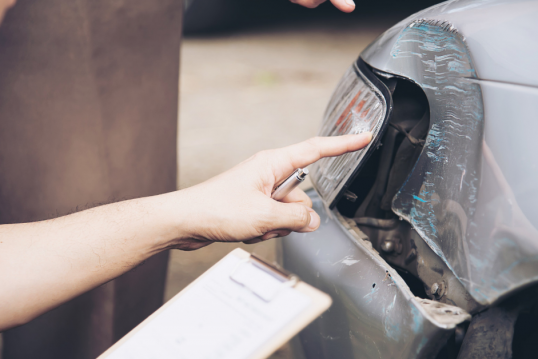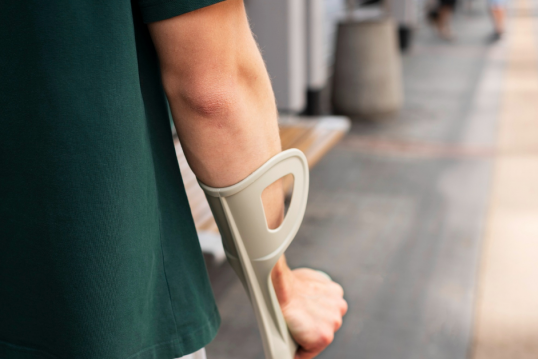Nevada attracts millions of tourists annually, and many of these visitors rent vehicles to explore during their vacations. Unfortunately, some of these visitors end up getting into accidents. When an accident involving a rental car occurs, there are numerous legal matters to consider, such as determining liability and filing injury claims.
If you have recently been injured in a Nevada auto accident involving a rental car, you likely have several questions. At the Cottle Firm, our Las Vegas car accident lawyers are prepared to help you navigate your Nevada rental car injury claim and seek compensation for injuries caused by negligence. Contact us today at 702-722-6111 to discuss your case in a free consultation.
Determining Fault in Nevada Rental Car Accidents
Determining fault is the first step in addressing any car accident, as it directly influences the claims process and potential compensation for injuries. Nevada follows a comparative negligence system, which means all parties involved in the accident are evaluated for fault and each party is assigned a percentage of fault based on the circumstances of the crash. You may only file a personal injury claim if you are found to be less than 51% at fault.
Law enforcement should always be called immediately following an accident. The police will document the crash, interview involved parties, and gather evidence. They will then write a police report, which is a vital document for determining fault. Additionally, photos, videos, witness statements, and physical evidence from the scene can be used to determine fault. An experienced Las Vegas car accident lawyer can also review your case, determine fault, and help you take legal action if the other driver was negligent.
Liability of Rental Car Companies
In some cases, the rental car company may be held liable for an accident. This liability can arise under specific circumstances.
Generally, rental car companies are protected from vicarious liability, meaning they are not automatically liable for the negligent actions of renters. This protection comes from the federal Graves Amendment, which shields rental car companies from being held liable solely because they own the vehicle involved in an accident. However, rental car companies may be held liable if there is evidence of direct negligence on their part.
For example, if the company failed to properly maintain a vehicle and this resulted in mechanical failure that caused an accident, they could be held liable. Similarly, if the company rents a car to someone unlicensed, intoxicated, or otherwise unfit to drive, and that driver causes an accident, the company may share liability with the driver.
If the accident was caused by a defect in the vehicle, a product liability claim could be filed against the manufacturer, and possibly the rental car company if they were aware of the defect and failed to address it.
Insurance Coverage for Rental Car Accidents
To navigate the claims process effectively, you will need to understand the insurance coverage available for rental car accidents. In Nevada, multiple types of insurance policies may apply, each with its own coverage limits and exclusions.
Personal Auto Insurance
If you own a personal vehicle, your auto insurance policy may apply to rental cars. This typically includes liability coverage, which covers damages and injuries you cause to others, and collision coverage, which pays for damages to the rental car. You should review your policy to understand the extent of your coverage, including any deductibles that may apply.
Rental Car Company Insurance
Rental car companies typically offer several types of insurance products that you can purchase at the time of rental. These include:
- Collision Damage Waiver (CDW) or Loss Damage Waiver (LDW): These waivers cover damage to the rental car, effectively absolving you of financial responsibility for the vehicle. However, they may have exclusions, such as not covering damage caused by reckless driving.
- Supplemental Liability Insurance: This provides coverage for damages and injuries you cause to others. While rental companies must provide a minimum liability coverage, it may be insufficient for serious accidents. You can purchase supplemental liability insurance for higher coverage limits.
- Personal Accident Insurance: This covers medical expenses for you and your passengers in the event of an accident.
- Personal Effects Coverage: This type of insurance protects your personal belongings from theft or damage while in the rental car.
Steps to Take After a Rental Car Accident in Nevada
The moments following a rental car accident can be stressful and overwhelming, but taking the right steps can help you recover from your injuries, comply with legal requirements, and support your personal injury claim. Here are some steps to take immediately after a rental car accident in Nevada.
Check for Injuries and Call Emergency Services
The safety of all involved priorities should be the first priority. Check yourself and others for injuries and call 911 to request medical assistance if anyone is injured. Even if injuries seem minor at first, they should be evaluated as soon as possible. Many types of car accident injuries have delayed symptoms and may worsen without prompt treatment.
You should also move to a safe location if possible. If the vehicles involved are creating a hazard or blocking traffic, and if it is safe to do so, move them to the side of the road or another safe location. Turn on your hazard lights to alert other drivers.
Report the Accident
The accident should be reported to the police and the rental car company as soon as possible. Most rental agreements require you to inform the company immediately following an accident. Provide them with all necessary details and follow their instructions regarding the next steps, such as arranging for a tow or obtaining a replacement vehicle.
Chapter 484E of the Nevada Revised Statutes requires motorists to report any accident that results in injury, death, or property damage exceeding $750 to police. Even if the accident seems minor, filing a police report is advisable, as it provides an official record of the accident. The police report will include essential information for determining fault and processing insurance claims.
Document the Accident
You will need to provide documentation when filing an insurance or personal injury claim for a rental car accident in Nevada. Collect information from everyone involved in the accident, including names, addresses, contact information, driver’s license numbers, vehicle make, model, year, and license plate numbers, and insurance company names and policy numbers.
If you are physically able to, you should also take photos and videos of the scene. This includes the positions of all vehicles involved, damage to each vehicle, road conditions and any relevant traffic signs or signals, any skid marks or debris on the road, and the overall scene, including surrounding areas. This visual evidence can help you support your version of events when filing a claim.
Dealing with Rental Car Companies After an Accident
If you are involved in an accident while driving a rental car, you will need to interact with the rental car company to report the accident, understand their procedures, and manage any potential charges or fees. If you were in an accident caused by the driver of a rental car, an experienced Las Vegas car accident lawyer can deal with the rental car company on your behalf.
Reporting Requirements and Timelines
Rental car agreements usually include specific requirements for reporting accidents. You should notify the rental car company as soon as possible, ideally after ensuring everyone’s safety and contacting emergency services. Provide the company with detailed information about the accident, including:
- The time and location of the accident
- A description of what happened
- Information about other parties involved, including their contact and insurance details
- A police report number, if available
Adhering to the rental company’s timelines is imperative. Delays can complicate the claims process and may even violate the terms of your rental agreement.
Potential Charges and Fees
After reporting the accident, the rental car company will assess the damage to the vehicle. Depending on the terms of your rental agreement and insurance coverage, you could be held responsible for certain charges, such as:
- Damage Fees: If you declined the Collision Damage Waiver (CDW) or Loss Damage Waiver (LDW), you could be liable for the cost of repairs. Even with a waiver, there could be exclusions or deductibles.
- Administrative Fees: Rental companies may charge fees for processing the accident, such as administrative fees, loss of use fees for the time the vehicle is out of service, and diminished value fees for reducing the vehicle’s resale value.
- Towing and Storage Fees: If the rental car needs to be towed or stored, these costs might be charged to you, depending on your coverage and the circumstances of the accident.
Handling Repairs and Replacements
Once the rental car company has assessed the damage, you will need to work with them to determine how the repairs should be handled. If you have purchased the CDW or LDW, these waivers typically cover the cost of repairs, but be sure to confirm any exclusions or limitations with the rental company. If you used your personal auto insurance or credit car insurance, you might need to contact those insurers to cover repair costs.
Review your rental agreement thoroughly to understand your obligations and the rental company’s procedures for handling accidents. Key points to look for include:
- The process for reporting accidents and damages
- Any coverage limitations or exclusions
- The steps required to arrange for repairs or a replacement vehicle
Arranging for a Replacement Vehicle
If your rental car is no longer driveable, you will need to arrange for a replacement vehicle. The rental car company may provide you with another vehicle, depending on the terms of your agreement and availability. If you purchased rental car insurance through the rental company, your coverage might include a replacement vehicle at no additional cost. If not, you may need to arrange and pay for a new rental separately.
Navigating Claims and Disputes in Rental Car Accidents
The claims process following a rental car accident can be complex and often involves multiple parties, including your insurance company, the rental car company, and potentially the other driver’s insurance company. Hiring a lawyer can help you navigate this process more effectively and ensure that you receive fair compensation for injuries caused by negligence.
Steps in the Claims Process
Contact your insurance company immediately after the accident. Provide them with all necessary details, including the police report, photos, and information about other involved parties. Your lawyer can help you present this information clearly and accurately.
If you purchased insurance from the rental car company, your lawyer can contact their insurance provider to start the claims process. They will ensure that all documentation and information about the accident are correctly submitted.
Your lawyer can help you collect and organize all relevant documents, such as the rental agreement, accident report, photos of the accident scene, and medical records if there were injuries. This evidence can help support your claim and establish the facts of the accident.
Finally, your lawyer will complete and submit the necessary claim forms to the appropriate insurance companies and ensure that all requested information is accurate to avoid delays.
Dealing with Insurance Adjusters
An insurance adjuster will likely contact you after your accident. It is best to only speak with these parties after you have contacted a car accident lawyer. Your lawyer will help you present information accurately and avoid common pitfalls that could jeopardize your claim.
Your lawyer will maintain records of all communications with insurance adjusters, including dates, times, and the content of the discussion. Insurance adjusters are trained to handle claims efficiently but may also try to minimize payouts. Your lawyer will manage these interactions professionally and advocate for your best interests.
Handling Lowball Offers and Disputes
Before accepting any settlement offer, your lawyer will help you understand the full extent of your damages, including vehicle repairs, medical expenses, lost wages, and other related costs. If the initial offer is too low, your lawyer will negotiate on your behalf, provide evidence to support your claim, and explain why a higher amount is justified.
Discuss Your Nevada Rental Car Injury Claim with a Las Vegas Car Accident Lawyer
Navigating rental car injury claims in Nevada can be complex and stressful. An experienced Las Vegas car accident lawyer can provide invaluable legal assistance and ensure that your interests are protected when navigating the legal and insurance systems. At the Cottle Firm, we help Nevada residents and visitors seek fair financial compensation for injuries suffered in rental car accidents and other types of accidents. Contact our Las Vegas car accident lawyers today at 702-722-6111 to learn more about your case in a free consultation.
Related:
Are Car Accident Insurance Settlements Taxable in Nevada?
Nevada Motor Vehicle Accident Statistics
Weeks After an Accident: Recognizing Delayed Car Accident Injuries









